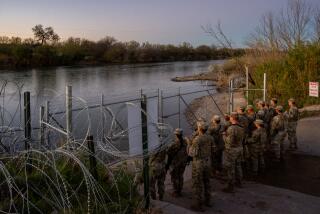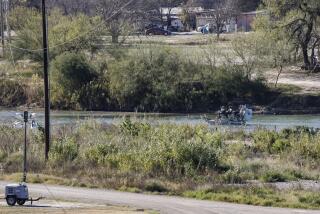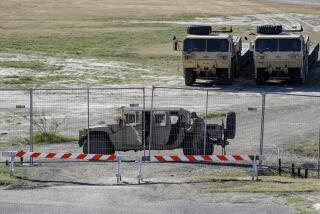Texas seeks out-of-state medical help amid COVID-19 crisis
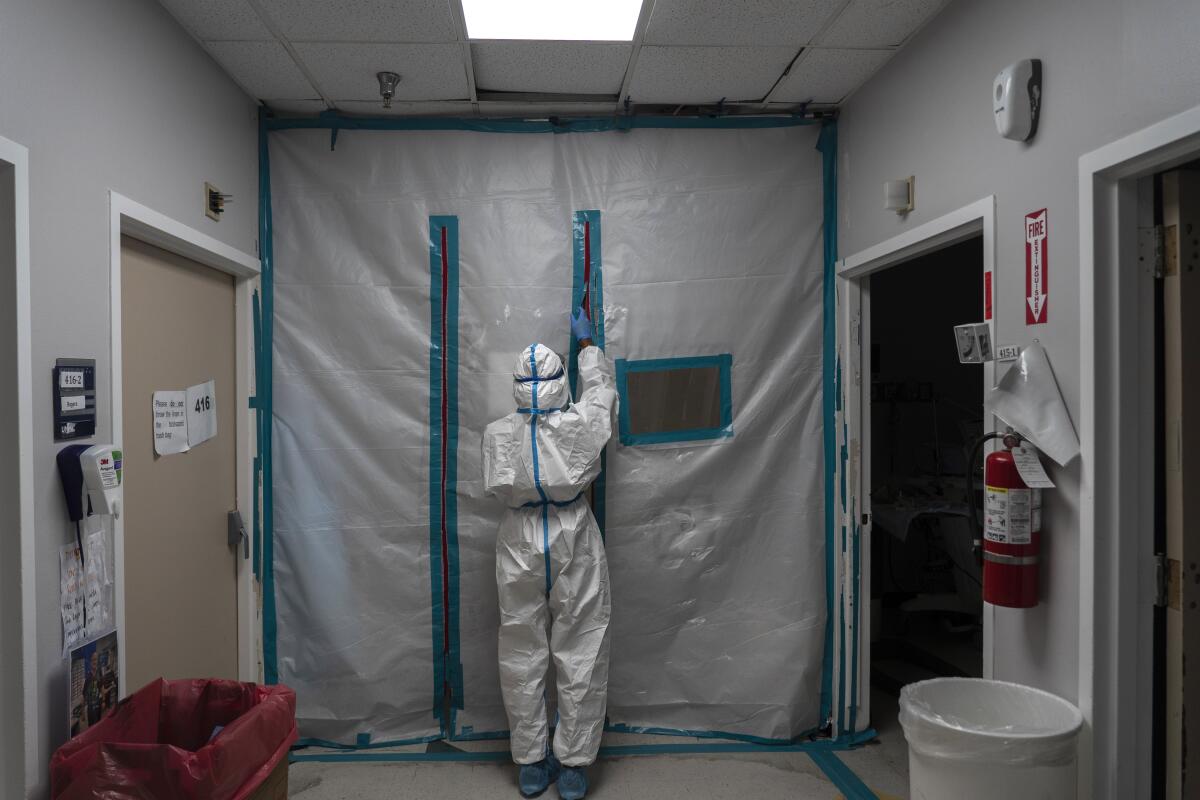
The Texas governor appealed for out-of-state medical help as COVID-19 hospitalizations soared, but he stopped short of reversing his ban on mask mandates even as leaders of the state’s largest cities and school systems imposed them.
Gov. Greg Abbott directed the state health department to use staffing agencies to find additional medical staff as the Delta variant overwhelmed hospitals statewide. Abbott also has sent a letter to the Texas Hospital Assn. requesting that hospitals postpone elective medical procedures.
President Biden recently called out Abbott and other Republican governors for blocking efforts to fight the pandemic.
“I say to these governors: Please help. But if you aren’t going to help, at least get out of the way,” Biden said.
But Abbott this week refused to reverse his executive order banning local officials from requiring masks or vaccines even as he faced challenges from Democrats leading the state’s largest cities and counties.
“The assertion that the governor of the state of Texas doesn’t have the authority to protect the rights and freedoms of Texans is just plain misguided,” Renae Eze, the governor’s spokeswoman, said in a statement Tuesday. “Texans have learned and mastered over the past year the safe practices to protect themselves and their loved ones from COVID, and do not need the government to tell them how to do so.”
Eze added that “removing government mandates, however, does not end personal responsibility or the importance of caring for family members, friends, and your community. Vaccines are the most effective defense against contracting COVID and becoming seriously ill, and we continue to urge all eligible Texans to get the vaccine. The COVID vaccine will always remain voluntary and never forced in Texas.”
On Tuesday, officials in San Antonio and surrounding Bexar County filed a lawsuit seeking a temporary restraining order so they can require masks in public schools and quarantine for unvaccinated students exposed to the coronavirus.
“The health of our students, especially those under 12 who are not eligible to be vaccinated, are being put at risk,” Nelson Wolff, Bexar County’s chief executive, said in a statement. “We need to continue to utilize every tool we have to combat the very contagious delta variant.”
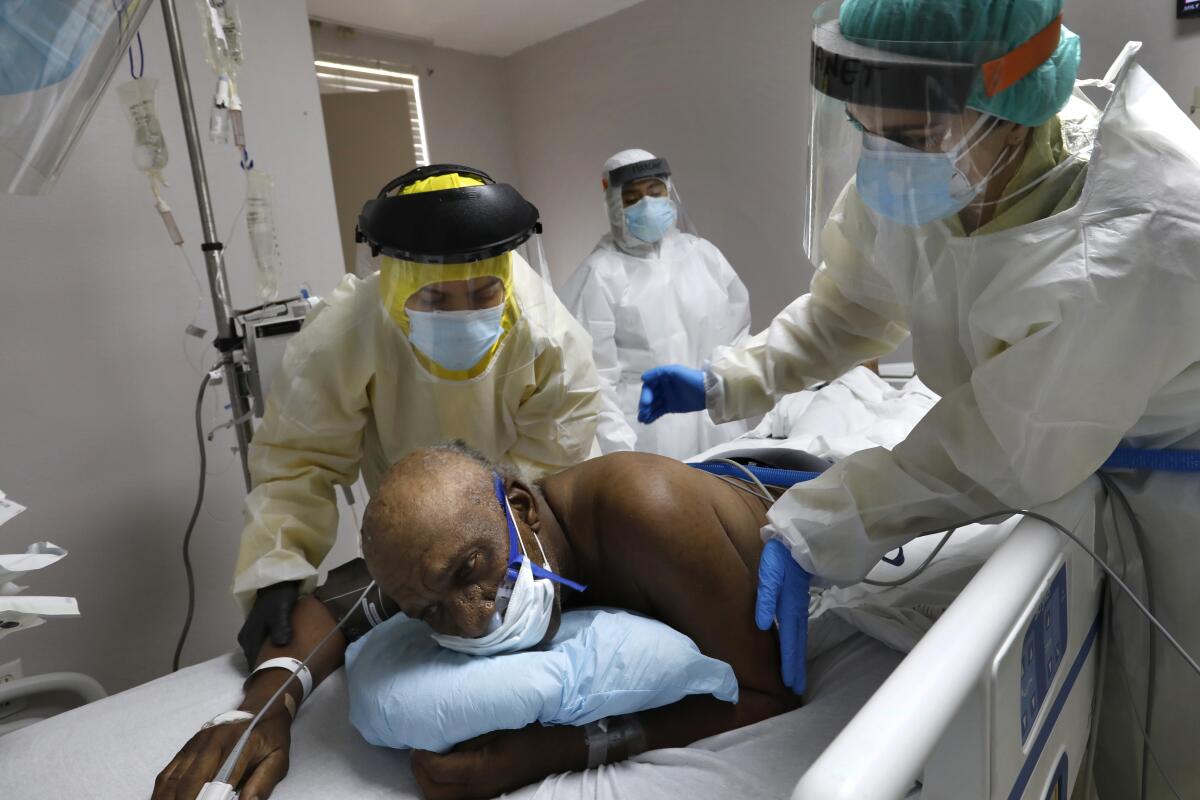
In Texas, where about 45% have been vaccinated against the virus, according to the U.S. Centers for Disease Control and Prevention, more than 10,000 people were hospitalized with COVID-19 this week as some students returned to schools where masks and contact tracing were not required. The U.S. has been averaging more than 110,000 new infections a day, and 56,000 people were hospitalized with COVID-19 Tuesday, levels not experienced since the waning days of the winter surge.
Florida and Louisiana reported all-time record hospitalizations this week, while Arkansas registered its largest single-day increase in hospitalizations.
Austin Mayor Steve Adler, a Democrat, called the Texas governor’s refusal to respond to the crisis by imposing a statewide mask mandate “unfortunate.”
“We’ve nearly run out of staffed ICU beds,” Adler said. “This is not a political or partisan issue, or it shouldn’t be. But local governments are going to have to do what they can to protect people.”
Houston Democratic congresswoman Sheila Jackson Lee visited a hospital there last weekend that had to transfer an 11-month-old COVID patient with unvaccinated parents because the facility ran out of beds. The hospital declared an “internal disaster” and has since erected two 2,000-square-foot tents outside to handle overflow, she said. She also spoke with a doctor who had five patients die of COVID in a day.
Jackson Lee contacted Biden administration emergency managers about assisting in Texas, and she said they were “ready to go.” She also contacted the governor, who had yet to respond Tuesday.
“I’m asking the governor to help his fellow Texans, many of them children,” she said. “He’s blocking wise decisions.”
Austin and Dallas school districts announced Monday that they would require students and staff to wear masks. The Houston school district — the state’s largest — announced a mask mandate its board is set to consider this week. Dallas County’s chief executive, Clay Jenkins, sued Monday to block Abbott’s mask mandate ban after a fellow member of the county commission refused to wear a mask.
“The enemy is not the governor and the enemy is not your unvaccinated neighbor or someone who disagrees with you. The enemy is the virus,” Jenkins said during a Tuesday briefing. “The time to act is now. This is about saving lives.”
Last week, Houston Mayor Sylvester Turner mandated masks for city workers indoors, and the city has been sponsoring Saturday vaccination clinics.
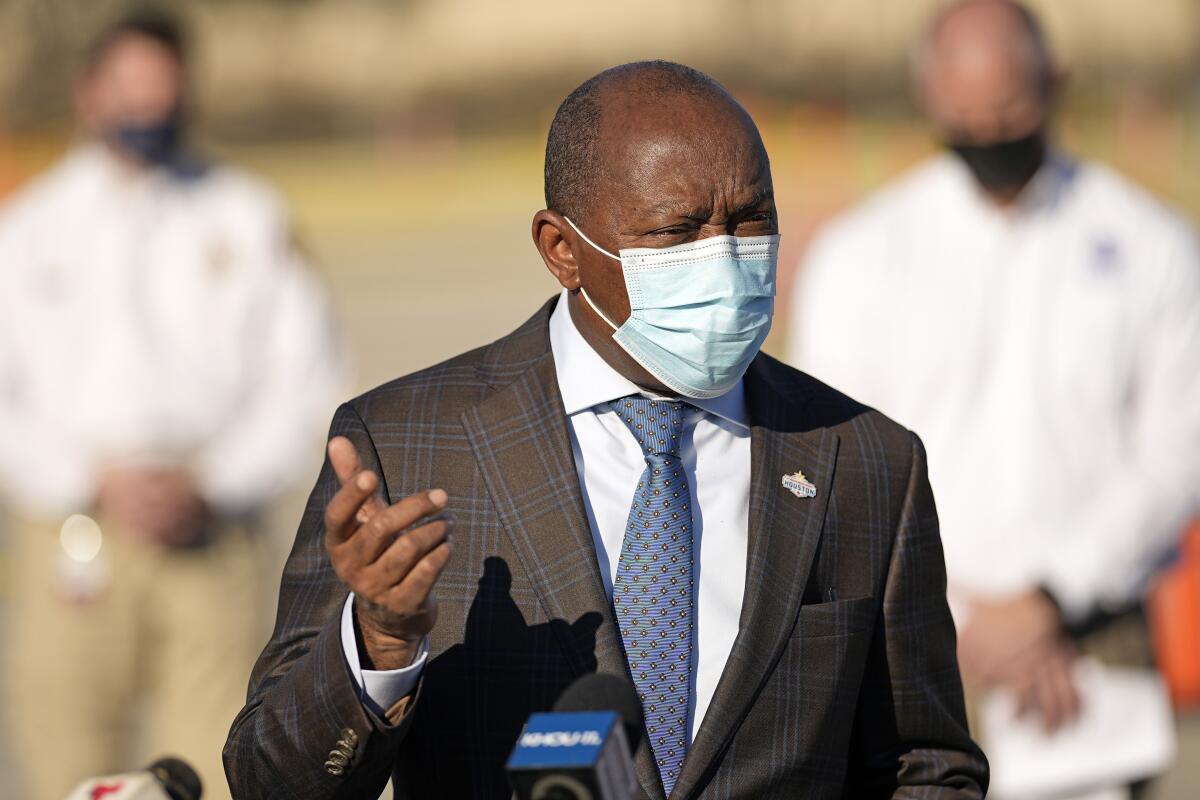
“It’s my hope that these two measures will slow the progression as we ramp up to meet the demand coming into our hospitals,” Turner said Tuesday, noting that the number of city employees with COVID has more than tripled during the last three weeks to 135, plus 93 police officers and 44 firefighters.
Turner said that he and other local officials had to act, that they couldn’t be “bullied” into leaving it up to individuals to take responsibility for protecting public health, as the governor suggested.
“We need our police officers, we need our firefighters and our municipal employees, and I don’t want them to bring this virus home to their kids,” Turner said.
Some Texas doctors also decried the governor’s stance on masks given the state’s unfolding medical crisis. COVID hospitalization figures don’t capture the full challenge, they said, because unlike past surges when the number of non-COVID patients decreased, this time they’re having to treat the influx on top of their full non-COVID workload.
“The governor’s not helping us here,” said Dr. Nicholas Steinour, an Austin-based emergency physician. “This is not the time to let down our guard. With the Delta variant, many of our healthcare providers are now getting infected. Nursing staffing is razor thin. EMS diversion is commonplace…. I don’t see that getting better in the next couple of weeks — I see it potentially getting worse.”
Most of the COVID-19 patients Steinour sees now are unvaccinated, and he said, “That has definitely made it a little harder as we put our personal health at risk to care for these folks.”
“There’s a sense that now this is a somewhat preventable disease and those that weren’t vaccinated really didn’t do their part in making sure we have the resources to care for others,” he said. “We’re having to constantly remind ourselves that we have a duty and an obligation to care for patients when we’re starting to look at them as, ‘This is your fault.’”
Doctors and nurses across Texas said they were running out of staff and space this week, leading to long waits in emergency rooms.
“No ICU beds anywhere. Lots of sick patients boarding in the [emergency room]. Massive nurse shortages. Nightmarish hellscape,” a Texas doctor wrote on a private Facebook group where doctors shared horror stories from the latest COVID surge here and in Florida, Alabama and other states.
Avery Taylor, a nurse manager at Houston Methodist Hospital System, had to nearly double the number of beds in her COVID unit to 44 in recent weeks, hire nearly three dozen additional nurses and a dozen nursing assistants. About 70% are contract staff.
“I’m tired, my nurses are tired,” she said. “We really thought that we were through this.”
Austin health officials issued an emergency alert over the weekend that the COVID situation in the city was “severely worsening.” A north Texas health system temporarily closed one of its emergency medical centers, citing a “critical COVID surge.” Patients were sent from Texas to Colorado and North Dakota.
In suburban Montgomery County north of Houston this week, the chief executive called the situation at local hospitals he’d visited a “crisis,” saying patients were being treated in closets, hallways and waiting rooms. Houston Methodist Hospital System was inundated with requests for patient transfers to its 350 intensive care beds and offering bonuses to retain nurses and lure new hires.
“Can you imagine the largest medical complex in the world and patients are being transferred out? People should pay attention,” Dr. Faisal Masud said from the packed intensive care unit he was managing Tuesday. “It’s really becoming life and death for patients…. Across the city, there’s a huge list of patients waiting for the emergency room, even if you don’t have COVID.”
Masud confers with hundreds of other critical care doctors across Texas on a WhatsApp group. Many are scrambling to transfer increasingly young COVID-19 patients to hospitals like his with extracorporeal membrane oxygenation (ECMO) machines that take over when their lungs fail, doing more than ventilators but requiring additional staffing. He’s had to turn down many because he doesn’t have enough staff.
Most of the patients he’s seeing are unvaccinated. Some are “family clusters” infected at gatherings. When they ask what they can do, he tells them to get vaccinated, and has staff immediately make arrangements, “otherwise disinformation out there might dissuade them.” So far, he said, none has refused.
But doctors elsewhere in Texas said they have treated COVID-19 patients who refused to get vaccinated afterward, along with their relatives.
“We provide the information, but some patients are still resistant to it,” said Dr. Ralph Riviello, chair of emergency medicine at UT Health San Antonio and University Health San Antonio, where most of those being treated — some repeatedly — were unvaccinated.
“Some say the disease will protect my body and some don’t even believe us when we test them and say they have COVID,” he said. “We’re seeing a lot of suffering and dying, people of all ages.”
But Riviello said the hospital has also seen an increase in those seeking COVID-19 vaccines who had postponed them or were waiting for them to be fully authorized by the Food and Drug Administration.
“Those are the people who we need to get to,” he said, to “try to dispel those vaccine myths.”
In the Austin area, Dr. Nathaniel “Than” Greenwood recently treated a friend’s unvaccinated father in his 60s who caught COVID-19 while traveling with his vaccinated wife on vacation in Missouri.
“She proceeded to get better and he proceeded to get worse,” Greenwood said this week. “He’s in the ICU and they’re now discussing withdrawing care.”
But that wasn’t enough to persuade Greenwood’s friend, a retired military service member, to get vaccinated. “I needed to convince him,” he said. “After we spoke about it, he said, ‘You convinced me,’ and he got it.”
Greenwood, chief medical officer for Austin-based Family Hospital Systems, described himself as “a staunch Republican” frustrated by Texas leaders’ political infighting. This week, he had 15 patients he would normally transfer that he hadn’t been able to move.
“Everybody’s full,” he said, and with students returning to schools and universities this fall, “the numbers are still going to go up and people are going to suffer. This should not be a political issue. It’s a public health issue. People need to wear the masks and we need to work together and think of the whole, not just the individual.”
More to Read
Start your day right
Sign up for Essential California for news, features and recommendations from the L.A. Times and beyond in your inbox six days a week.
You may occasionally receive promotional content from the Los Angeles Times.

